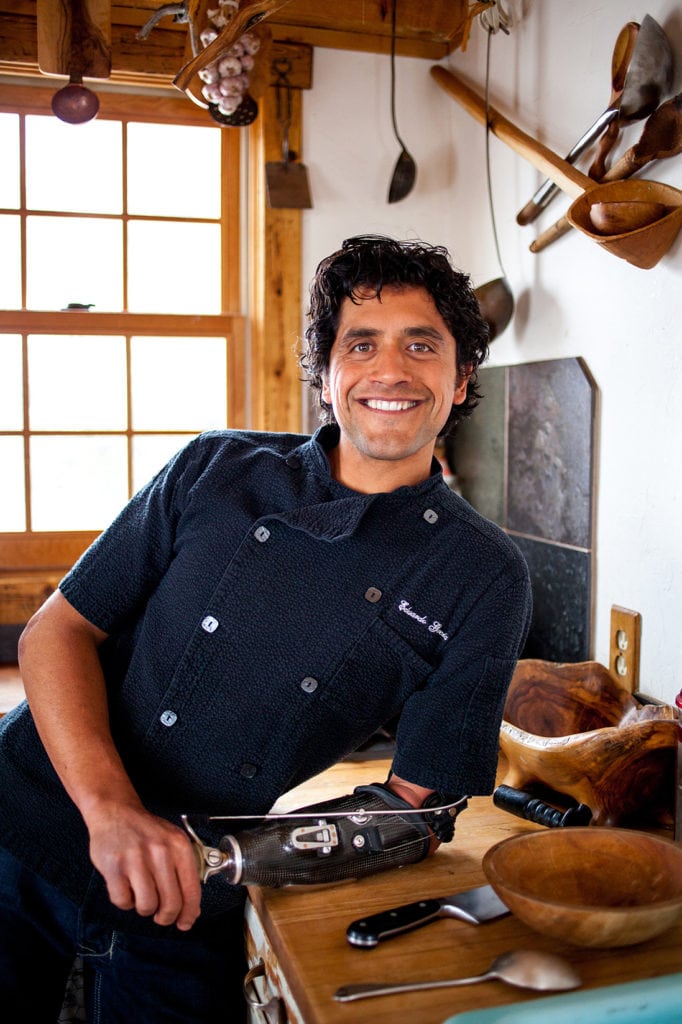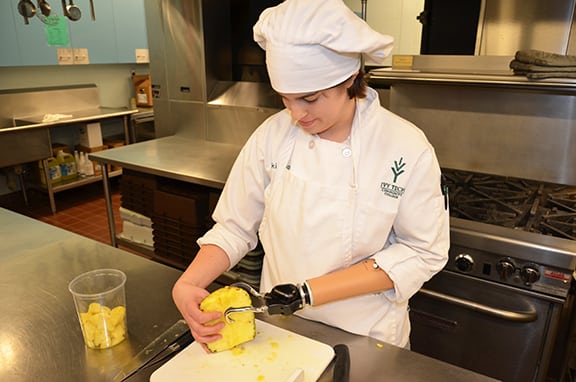By Emily Dings
Any episode of Top Chef will show you that to succeed in the kitchen, a chef must be a good planner, keep cool under pressure, and be able to adapt to unexpected situations. Notably, these are some of the same qualities amputees must possess as they navigate through life. It may come as no surprise, then, that many chefs who are amputees have found great success in their occupations.
Nicole Clark, a chef with a love of baking, has been an amputee all her life. Born three months early as a triplet, Clark had no circulation in her left arm, and she had to have it removed when she was less than 3 weeks old. Her interest in cooking took root when she was in junior high and found herself drawn to cooking shows on the Food Network. She started to practice basics like cracking eggs and opening food packages, and soon she began attending local cooking classes. By her senior year of high school, Clark was working in a cake shop with plans to enroll in a culinary arts program.
Culinary schools are known for being fast-paced and physically demanding, a reputation that can be intimidating to any aspiring chef. But when Clark enrolled in the Culinary Arts Program at Ivy Tech Community College in Fort Wayne, Indiana, her determination and passion for cooking set the tone for her success in the program. “They were very willing to accommodate me,” she says. Instructors created workarounds for certain tasks, and classmates were eager to help by holding a bowl or tool for her when needed. Clark graduated in 2015 and will soon begin a new job as a chef at a local elementary school.
“I’m still learning how to manage stress,” Clark says of her professional experience since graduating. “If something doesn’t go right, I either learn how to fix it or I ask someone, ‘Can you help me, or should we start over?’ You kind of learn as you go.” Over the years, she has learned which adaptive cooking tools are most helpful, among them drawer liners (to create nonslip surfaces) and a cutting board with nails that hold the food in place. Her current prosthesis has both a hand and a hook attachment, the latter of which helps her perform tasks like taking hot pans out of the oven and washing dishes.
Clark cautions that pursuing a career as a chef isn’t easy. But, she adds, “It’s definitely doable with a lot of hard work and passion and patience. You have to put in a lot of hours, but it’s definitely worth it.”

Eduardo Garcia’s path to the profession unfolded when he was a teenager, slinging pizzas and flipping burgers at the Chico Hot Springs Resort in his native Montana. Unlike most teens working restaurant jobs to make some extra cash, though, Garcia began taking the work home with him.
When preparing a burger in his own kitchen, Garcia took great pains to perfectly brown the meat on every side. “I made the act of cooking a hyperfocused event,” he says. This concentration remained keen and eventually led him to a degree at The Art Institute of Seattle Culinary School and ten years as a private chef in the yachting industry.
Garcia’s ability to tune in also turned him into an avid outdoorsman, and he credits his early love of hunting, fishing, and exploring with influencing his “experience-driven” approach to cooking. On a backcountry hike in 2011, he encountered a bear carcass and approached it to take a closer look. With a small knife in his hand, he knelt to remove a claw from the very decayed remains of the bear. Before his knife made contact he was shocked with electricity from a buried high-voltage power source below the bear. At age 31, his entire life changed.
Badly burned and nearly dead, Garcia endured an unrelenting series of ICU visits and surgeries in the coming months. Once his burns were treated, he underwent 21 procedures, including the removal of ribs and dead muscle mass, scalp reconstruction, and, ultimately, the amputation of his left hand and forearm. Midway through the course of his surgeries, Garcia was dealt yet another blow: He was diagnosed with stage 2 testicular cancer. His surgeries were postponed so he could undergo chemotherapy.
The documentary Charged chronicles the period from Garcia’s accident to reentry into his chosen profession. In the film, he expresses deep appreciation for the people who helped him during his precarious recoveries, in the hospital and when he was finally able to return to work. His years spent in kitchens made him aware that trying to do everything himself wasn’t going to cut it. In restaurant jobs, he says, “teamwork is king,” so allowing himself to accept help from his care team, family, and friends was intuitive.
Garcia is now the co-founder of Montana Mex (www.montanamex.com), a preservative-free, non-GMO condiment company he had been poised to launch before his accident. Garcia sees the company as an extension of his commitment to the clean eating he credits with helping him recover. In the kitchen, he uses a body-powered hook prosthesis that he reinforced with a steel plate in the forearm area, which receives the most wear and tear from his cooking and day-to-day living.
Garcia insists that there is no one-size-fits-all solution to overcoming trauma. He enjoys meeting amputees who have been inspired by his story and share their own dreams of culinary careers. His belief that a little encouragement can help individuals find their own approach is echoed in Montana Mex’s philosophy. Rather than preparing a full meal for someone else, the company creates condiments that add a special, elevating element to a meal people create themselves. For Garcia, in cooking as in life, individual experience is irreplaceable.

Colt Munchoff also sees cooking as a powerful way to connect with others. Growing up working in his mother’s catering company in the resort town of Sun Valley, Idaho, he learned the rhythms of the kitchen as a dishwasher and line cook. Athletic and ambitious, after college he headed to California where he attended the Los Angeles Culinary Institute in Burbank and excelled in club-level beach volleyball. He finished his degree and moved to Cardiff, California, to open a restaurant with friends.
In 1993, Munchoff’s car was rear-ended and a sports trophy he had in his car slammed into the back of his head, causing a closed head injury. He awoke in the hospital after a 12-day coma, unable to eat, drink, speak, or walk. Although he regained these abilities after a few months of physical therapy, the paralysis in his left arm and hand was permanent. He was 23 years old.
Over the next couple of years, Munchoff explored his options. His greatest skills had always been physical, and he wondered how his paralysis would affect the trajectory he’d imagined for himself. Complicating matters further, little was known about traumatic brain injury (TBI) at the time. He remembers when the doctors told his mother “he’s young and healthy—he’ll be fine.” There was little guidance for how this would be achieved, however.
A dawning gratitude brightened dark days. Munchoff remembered the small pleasures of his early recovery, when he was able to drink water for the first time and eat his first solid food, an orange. “What a gift!” he says. While nannying for a friend’s children, he began experimenting with cooking tools again and found a eureka moment in the form of a handheld onion chopper.
Munchoff realized that he could help people with limited range of motion regain independence by teaching them to use adaptive cooking equipment. Because disabilities can impair motion, he realized, they can also lead to unhealthy habits born of convenience, such as eating fast food. He began making video demonstrations of how to prepare healthy recipes using tools that could be operated using one hand, such as an immersion blender, and stabilizing equipment, such as a nonslip cutting board.
Soon thereafter, Munchoff formed a foundation with the sole mission of teaching adaptive cooking techniques to people with disabilities. Students include individuals with TBIs and multiple sclerosis as well as amputees. Although he is not an amputee, due to his left-side paralysis he is known as the “Emeril Lagasse of one-handed cooking.” Munchoff Foundation courses cover everything from nutrition to knife skills. “Whoever shows up, we work with them,” Munchoff says, regardless of the nature of their limitation.
Munchoff has many aspirations for the foundation, chief among them securing corporate sponsorship to create an online library of adaptive cooking videos to reach more people who could benefit from them. After all, as Clark, Garcia, and Munchoff demonstrate, with the right resources and attitude, amputee chefs can be cooking with gas.



